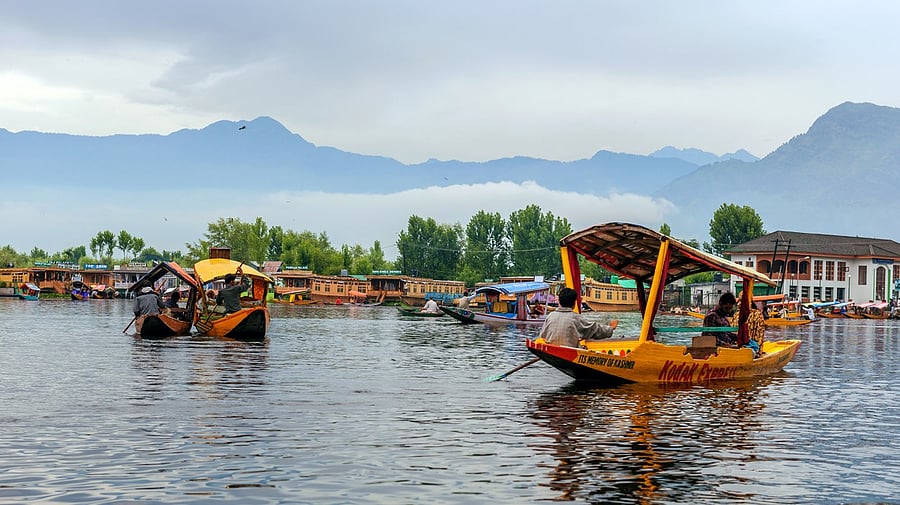
'Startups are becoming the new language of hope in Kashmir'
Credit: iStock Photo
Srinagar: Once synonymous with shutdowns, stone-pelting and hartals, Kashmir is now quietly scripting a new narrative — one driven not by protests, but by startups.
Across the Valley, a generation shaped by conflict is turning toward innovation and entrepreneurship, transforming challenges into opportunities and redefining what it means to grow up in a region long marked by turmoil.
Official data reveals that Jammu and Kashmir has witnessed a sharp rise in entrepreneurial activity. Nearly 1000 startups were registered under the Startup India initiative by the end of 2024 — a remarkable leap from just a few hundred four years ago. The newly notified J&K Start-up Policy 2024-27 aims to take that number to 2,000 by 2027, offering incentives, incubation support, and funding for emerging ventures.
“Startups are becoming the new language of hope in Kashmir,” said an official at the Jammu and Kashmir Entrepreneurship Development Institute (JKEDI), which has been mentoring dozens of young entrepreneurs.
Universities as new incubation hubs
The University of Kashmir has emerged as one of the most active incubation centres under the NewGen IEDC (Innovation and Entrepreneurship Development Centre). At its helm is Prof Irfana Rashid, often described as the Startup Sherpa of Kashmir University, whose mentorship and programmes have given shape to dozens of student-led ventures.
“For years, I taught entrepreneurship in classrooms,” Irfana told DH. “Now, I finally get to bring those lessons to life.”
Her approach blends academic mentorship with a deep understanding of local context. “Where there’s a will, there’s a way. Show us your will, and we’ll help you find the way,” she says, describing her mission to create a culture of coopetition — collaboration among competing startups to share resources and build a stronger ecosystem.
She identifies sectors such as saffron, walnut wood, trout farming, medicinal plants, agritech, and tourism as Kashmir’s next frontiers for innovation. “We offer support, but we also expect accountability. Nothing truly valuable comes free,” she adds.
Diverse sectors and women entrepreneurs
The growth of startups in Jammu and Kashmir is not confined to tech or e-commerce. A 2024 survey by Startup Kashmir shows that nearly half of the region’s ventures operate in construction and engineering, followed by skill development, business support, food processing, IT consulting, and agri-tech.
Equally notable is the rise of women entrepreneurs — a figure that would have seemed improbable just a decade ago. Of 917 startups recognised by the DPIIT by 2024, over 330 were women-led, many operating in fashion, handicrafts, wellness, and digital education.
From hartals to hustle: Stories of change
For many, the journey from curfewed streets to co-working spaces has been both personal and political. Young founders recall days when internet shutdowns would cripple operations, yet resilience became their biggest resource.
“There was a time when we only thought of government jobs,” said one Srinagar-based entrepreneur running an eco-friendly packaging startup. “Now, my startup employs 12 people — that’s 12 more who don’t need to leave the Valley to find work.”
Yet challenges persist. Connectivity disruptions, funding scarcity, lack of mentorship, and weak investor confidence continue to hamper growth. Many founders still depend on family savings or small government grants to get started. Logistics and supply-chain hurdles also remain in a landlocked region with a short working season.
Still, as Prof Irfana puts it, “Every successful startup here is a small act of defiance — against stereotypes, against hopelessness.”
Reimagining Kashmir’s future
The startup movement may not yet have the scale of Bengaluru or Hyderabad, but its symbolic value in Kashmir is immense. It reflects a generational shift from grievance to growth — from street protests to pitch decks.
As policies strengthen and institutions like JKEDI and the University of Kashmir continue to mentor talent, the region’s youth appear determined to prove that the Valley’s next chapter could be written not in the language of conflict, but of creativity and commerce.
If the momentum continues, Kashmir could soon be known not just for its beauty and conflict — but for its startups that bloom against the odds.